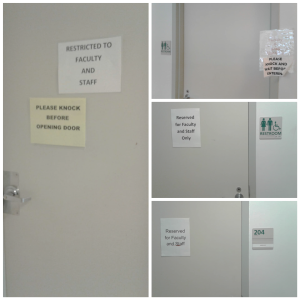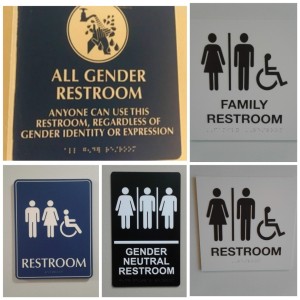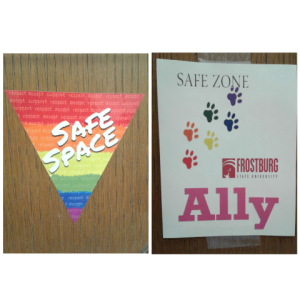One Step Forward or One Step Back?: A Look at Trans Inclusiveness on FSU’s Campus
Frostburg State University has been working toward a more transgender inclusive campus for the past several years. Through faculty and staff support, access to gender-inclusive housing and the addition of some gender-neutral restrooms, FSU has been steadily becoming a more welcoming and inclusive space.
“I think the best judge of a society is how they treat the minorities, and FSU does an excellent job of being accepting towards people like me,” said Kylie, a transgender woman at FSU.
Despite the changes made so far, FSU still has a way to go before it can really be seen as a trans-inclusive university. Trans students still face difficulties in being open about their gender-identity on campus.
“Overall I think the campus could do plenty more,” said A, another transgender student at FSU, who has chosen to only be identified by his first initial. “The campus feels like many other places do to people like me – uneducated and at times unsafe. The school hasn’t made that effort to set themselves above other schools in terms of being an ally, and I’d certainly like to see that.”
For reasons like those alluded to by A, each student interviewed has requested that their last names be omitted, even Kylie, who expressed praise on the campus’ acceptance. That is not to say that this is a campus-specific issue, as transgender individuals face harassment and struggles throughout the world, but it would still be beneficial if FSU could become a safe and welcoming place for them.
An article from The Bottom Line written in 2015 explained some of the initiatives that FSU had planned to undertake. In the article, “Making the Transition: FSU Pursues Transgender-Inclusive Initiatives,” Nick DeMichele discussed the plan for gender-neutral housing and restrooms.
DeMichele explained that Brian Medina, then Area Coordinator of Residence Life at FSU who wrote this policy for the university, stating the new housing “focuses on creating an inclusive environment where students can live in the same room with any student – regardless of sex, gender, gender identity, or gender expression,” and the housing would be “open to all students.” Medina also told DeMichele that during the upcoming summer (summer of 2015) that “FSU Maintenance will transition all of the single-stall bathrooms on campus into unisex facilities.”
Gender-Inclusive Housing
Since the publication of the article four years ago, possibly the biggest improvement FSU has made on the subject has been its gender-inclusive housing. Annapolis now, and Cumberland when it is finished, offer gender-neutral quad housing. Frederick Hall and Westminster Hall can have gender-neutral quads as well, but the exact number is determined by how many students apply to be housed in them that year.
For the 2018-2019 year, Frederick had two and Westminster had four. Katie Buehner, assistant director of Residence Life, explained that all the housing is inclusive regardless of whether they are designated gender-neutral or not. “Any student can live in any housing that matches their gender identity,” said Buehner. When asked about Simpson Hall, the women-only housing option on campus she responded: “Anyone who identifies as a woman can live there, if a trans woman wanted to live there then she absolutely could.”
Applying for gender-neutral housing is only a few steps extra than the initial housing application. When going to apply for housing on the FSU website, a student can select “All Students Optional Gender-Inclusive Community Agreement and Application” in the dropdown menu under “Applications” in the top red banner.
All students must sign an agreement about adhering to FSU policies and must agree to such terms as: “assist[ing] other residents living within the Gender Inclusive Housing to maintain a space that is inclusive, affirming, and safe for all residents,” and “promote[ing] and attempt[ing] to use inclusive language within and outside of the community. . . [including] what is referred to as a Preferred Gender Pronoun (PGP) as the individual wishes to be called.” Students also must agree to be responsible for themselves and guests in being supportive of all gender identities and expressions.
After signing the agreement, students have the option to request a specific person as a roommate and also provide their preferred name. Buehner explained if a preferred name is entered, this is the name that will be used for door tags, as well as what name the RAs will be told to use.
Maryland Law, FSU Policy and General Statistics
Transgender Law Center (TLC), the largest national trans-led organization advocating self-determination for all people, ranks Maryland high on their policy tally. According to the TLC website, “a state’s ‘policy tally’ counts the number of positive laws and policies within the state that help drive equality for LGBT people.”
Senate Bill 212, otherwise known as Fairness for All Marylanders Act of 2014, “prohibit[s] discrimination based on gender identity with regard to public accommodations, housing, and employment” in which a public accommodation is described as including any place such as lodging, food or drink establishments, theatres and arenas, places of retail, and any establishment found within those aforementioned places.
This bill failed to provide parameters regarding restroom usage. However, in March 2018, the United States District Court for the District of Maryland ruled that transgender students’ right to use the restroom and locker rooms in alignment with their gender identity is protected by federal law. This decision was a result of the court case M.A.B. v. Board of Education of Talbot County.
FSU’s own “Statement on Non-Discrimination and Equal Opportunity” states that “Frostburg State University does not discriminate on the basis of race, color, religion, sex, gender, sexual orientation, gender identity or expression, national or ethnic origin, age, status as an individual with a disability (including pregnancy), veteran status, genetic information, or other protected classes under applicable state and federal laws.” Also stated in FSU’s policy is to “ensure all persons have equal opportunity and access to academic and education programs, services, activities, and facilities.”
The law and University policy may appear to present restrooms as open and accommodating to transgender individuals, but this is often not the case.
“I know the state law,” said Blaire, a trans woman and student at FSU. “Transhood has such little presence on campus; I feel like I’ll still run the chance of being harassed at any turn.”
Blaire is not alone in her fears, and the unfortunate truth is that transgender individuals do get harassed across the country for using restrooms that match their gender identity.
In 2015, the National Center for Transgender Equality released the results of their survey of 27,715 respondents. The results showed 59% of respondents had indicated they avoided using a public restroom in [that] past year, 24% had their presence in a restroom questioned or challenged, 12% had been verbally harassed while accessing a restroom, and 9% had been denied restroom access. It is because of reasons such as these that having access to gender-neutral restroom options is so important for the transgender community.
The Restroom Situation On Campus

With the addition of gender-inclusive housing also came access to gender-neutral restrooms across campus. As a gender-inclusive housing option, all restrooms in Annapolis (and Cumberland when finished) are gender-neutral. These restrooms have signage indicating that everyone, regardless of how they identify or express themselves, are welcome.
The restrooms in quads that were designated gender-neutral for the year in Frederick and Westminster likewise are gender-neutral. Aside from that, each residence hall has one gender-neutral restroom, including Simpson Hall.
While there has been a lot of progress in terms of gender-neutral housing, there still are not very many gender-neutral restrooms outside of those housing buildings on campus, and the signage for such facilities vary widely between restrooms.
Outside of housing, there are only 13 gender-neutral restrooms throughout the entire campus, though not all of these are readily accessible to students. The Brady Health Center has an unmarked unisex restroom, but it is not technically a public facility as it can only be accessed upon request. The 7 American sociology building across the street from Diehl has one as well, but again, this is not a location that gets a lot of student traffic. The police station also has one.
The Gira Center (CCIT) has four: two on the first floor and one on the second and third each. The Lane Center has two on the second floor on the opposite side from the lounge and lobby.

The remaining four gender-neutral restrooms can be found in the Compton Science Center. There are two on the second floor and two on the third floor. These restrooms are single-occupant, just as the other gender-neutral ones on campus.
The 2015 article from The Bottom Line also discussed an initiative to change all the single-occupant restrooms to gender-neutral: a transition that was never fully realized. Guild still has a single occupant men’s and a single occupant women’s restroom that were never changed. The restrooms in CAPS also have a single occupant men’s and women’s.
There do not appear to be any near-future plans in place for physically adding in more gender-neutral facilities or in converting the remaining gendered single-occupant restrooms.
John Brewer, assistant director of planning, maintenance and housekeeping explained they changed the restrooms they were told to, and there had not been mention of continuing the project.
Buehner of Residence Life mentioned there were a few leftover restroom signs from those used in Annapolis, that were given to Facilities a few years back, but appear to have been left in storage since then.
Title IX
The Title IX Coordinator at FSU, Benjamin T. Brauer, was consulted in March 2019 about transgender inclusiveness on campus. He explained there are no specific guidelines for handling cases involving transgender students as a whole outside of housing: “we handle these sorts of things on a case by case, individual, basis on campus to determine what’s best for the individual” said Brauer.
The Athletics Department
Looking more broadly, there are other subtle things that can be observed across campus that show how the campus still is not quite as inclusive one would hope for, especially in terms of transgender individuals who do not identify within the gender binary of male or female.
One such instance appeared in the Recreation and Athletics facilities survey conducted in April 2019, in which it failed to provide an option for gender other than male or female.
The athletics department also fails to consider nonbinary persons, though it does have a clear policy on transgender student-athletes.
FSU’s “Policy on Transgender Inclusion in Athletics” can be found in the department’s “Policies and Procedures Manual,” but is currently not readily available for students to access. However, Troy Dell, Athletic Director, expressed interest in changing that. He also explained with the move to Division II, the policy will likely change to match any new NCAA guidelines.
The current policy has guidelines for both students undergoing transition and those who are not. Trans male student-athletes who are on testosterone and in the process of transitioning “may compete on a men’s team, but is no longer eligible to compete on a women’s team.” A trans female on testosterone suppression medication “may continue to compete on a men’s team but may not compete on a women’s team. . . until completing one calendar year of testosterone suppression treatment.”
The guidelines are a bit different for transgender athletes who are not in the process of hormonal treatment. The policy states that a trans male “who is not taking testosterone related to gender transition may participate on a men’s or women’s team,” and a trans female “who is not taking hormone treatments related to gender transition may not compete on a women’s team.
While the policy does not consider nonbinary students, Dell explained that if an instance arose with a non-binary student, they would be able to choose which team they felt most comfortable with. Dell expressed an overall interest to learn and openness about helping transgender student-athletes as well as learning more about the topic as a whole.
“We need to work through and have conversations with individuals who aren’t sure or aren’t transitioning to get where they need to be,” said Dell. “Most of my peers are working on best practices and getting educated. Our intention is to help whoever and make sure their athletic experience is everything it can be.”
Dell pointed out that his peers were working on being educated: a statement that rings true for many on this campus. A lot of the issues those in the trans community face on campus stems less from intentional hostility, but more from an overarching lack of awareness and understanding from others.
Lack of Awareness and Training
A former, transgender faculty member from FSU who chose to remain anonymous, shared his thoughts and experiences on the matter during his time on campus.
“I’m not sure many people in the town or the campus community had much knowing face-to-face contact with trans people, so when folks started finding out about my identity, I could feel their discomfort,” he said. “This discomfort was hard to put a finger on, hard to name because many folks were genuinely friendly. This doesn’t mean, though, that they were comfortable.”
A big part of the lack of awareness also comes from inconsistent training provided for the faculty and staff. FSU’s main training involving inclusiveness is the Safe Zone Program, which “is designed to support students, faculty, and staff who identify as an ally and advocate on behalf of lesbian, gay, bisexual, transgender, and queer (LGBTQ) community.”

Buehner explained some of what goes into the program includes: “education around gender and sexual orientation,” definitions and explanations on things like “preferred pronouns, names, and how to be good community members,” different resources and scenarios, and bystander intervention.
The program has some flaws though. Probably the biggest flaw is that it is optional rather than required. It is something that faculty and staff have to sign up for and is a one-day, one-time training that is not even offered regularly.
Jennifer Earles, the advisor of Spectrum (FSU’s LGBTQ+ club), explained the last time the training was offered was Spring 2018, and Buehner estimated the training prior to that one being some time in 2016.
Those who have completed one of these trainings in the past often have a note on their door as proof that they completed the training and are a pledged ally.
“‘Safe Space’ stickers on office doors is great,” said Kylie. “Knowing there are people who acknowledge that some groups of people may just need somewhere to hide from the outside world for a few minutes.”
While faculty and staff do occasionally have the opportunity to participate in Safe Zone training, no such program exists for students. What little training faculty and staff do get is still significantly more than what a transgender student’s peers receive.
“I think students should go through training about LGBT groups,” said A. “It doesn’t have to be long, just something that acknowledges that the college is aware and actively trying to help the trans population who are assaulted and killed on the regular: especially on campuses.”
The unawareness goes beyond typical faculty and students as well. The Brady Health Center offers few resources or services specific to transgender issues. Blaire briefly discussed her experience with Brady Health. “I was self-dosing estrogen when I first came out and went to Brady Health for advice and help,” explained Blaire. “The doctor I had was helpful, but a bit unaware of what to even ‘call’ me. FSU has no medical resources or training for trans care in their health department.”
While Brady Health lacks transgender services, the Registrar’s Office does allow students to update both their legal gender and name as well as their preferred name. Students must fill out the “Personal Data Update Form” that can be picked up at the Registrar’s Office or downloaded from the “Updates to Personal Data” page on FSU’s website.
Legal and Preferred Name Changes
Regarding preferred names over legal, the document states, “while on campus, you may elect to use a name other than your legal name. . . In essence, your preferred name will appear on everything except your official transcript and financial aid documents.” To have an FSU username and email address changed, a student must request so by contacting the Help Desk.
To update a legal name and gender, the form must be submitted with a copy of one of the following legal documents: Birth Certificate, Driver’s License, Court Order, Marriage License, Dissolution Decree, Passport, Permanent Resident Card.
The form only has gender options of female or male, but Gail Lutton, the Administrative Assistant/Supervisor in the Registrar’s Office, explained this is in relation to an input issue, as the university system doesn’t allow for a third option to be entered.
Despite this being a relatively effective catch-all system to changing one’s name, there are still instances of students’ old name or “deadname” appearing in certain applications. A transgender student, who will simply be referred to as “J” explained his experience in this matter.
“My Bobcat Connect had the wrong name in it, so it basically outed me to my boss,” explained J. “I left school and came back after I changed my name so this shouldn’t be happening.” J explained that it was an easy fix but stated: “the whole experience just really shook me up.”
The issue could have arisen as a result of Bobcat Connect being separate from the main University system, “Students can use Bobcat Connect to track their co-curricular activities, manage student elections for clubs and even view recommended activities based on their interests and goals,” but it is definitely something that needs to be looked into to avoid situations such as this. “I just want to say that even though I have had to struggle to get to the point I’m at, I hope that shining a light on these issues makes it easier for trans people who come after me,” said J.
The University as a whole, while not working actively against the trans community, has ultimately done little in making them feel welcomed. “I would say that like me, other trans people can sense when an environment hasn’t done the work,” said a former FSU faculty member.
Working Toward an Inclusive Future
Robin Wynder, director of FSU’s Center for Student Diversity, Equity, and Inclusion, spoke about the revived University Council on Diversity, Equity & Inclusion, of which she is co-chair. She explained that a number of student groups and faculty will have representatives in the council. “My idea for how it will work is that different groups will be assigned different topics of concern on campus so that they can be easily managed, but also have more ground covered,” said Wynder. The issue of trans inclusiveness on campus is one that she mentioned will likely be tackled. One idea she hopes to see fulfilled includes having all restrooms in the Lane Center and other buildings temporarily designated gender-neutral during events.
Aside from the council, there are several other ways that the campus could start working toward becoming more inclusive. Helping those on campus become more informed and simply putting forth an atmosphere of awareness on transgender issues on the website or through events would be a good starting point. Having a required training like Safe Zone for both faculty, staff, and perhaps even students would help. Simply changing the signs on the existing single-occupant restrooms would also be a good first step. In the long-term, having an office specific for LGBTQ+ related issues would also be largely beneficial.
Jennifer Earles, advisor for Spectrum, had a number of ideas, both from herself and her students on steps that could be taken campus-wide including: “Advocate[ing] for the campus health center to provide direct insurance coverage for hormones and gender confirmation surgeries for transitioning students, sponsoring regular transgender-specific programs and including trans-related events during LGBTQ pride weeks and awareness months, and widely publicizing campus trans-inclusive policies.”
Earles also explained some things that faculty does and should do, to be inclusive. Actions such as including their own pronouns in email and introducing themselves to their classes by stating their own preferred pronouns may seem small, but they are big steps in the right direction. Other actions she mentioned included the use of “they” as a gender-neutral pronoun and calling out transphobia and transphobic language in the classroom.
Ultimately, there are plenty of things the campus could do to become more trans-inclusive. Even starting out small by promoting that the campus is aware of current issues and has people willing to help those in the transgender community would do a world of good.
“The institution has to value that trans people’s safety and comfort matter,” said the former faculty member. “Sometimes, well-meaning folks just don’t know – they haven’t had a reason or opportunity to learn but are willing to change. While I realize that these changes do not happen overnight, we who are ‘other’ might not be able to suffer the wait. Sometimes we need to leave and find more inclusive environments as a matter of survival.”
Correction: An earlier version of this article inaccurately described Frostburg State University’s Office of Gender Equity and the Title IX Coordinator.





1 Comment
I am deeply honored and thankful that you wrote this follow-up piece regarding trans inclusion efforts at Frostburg. We made a lot of strides a few years ago in terms of housing/restroom opportunities but I am sad to hear that other areas have stalled a bit. I am particularly disappointed that trans and gender non-conforming students don’t feel safe or comfortable while on Frostburg’s campus. As someone who identifies as genderqueer myself (pronouns ze/hir/hirs), I am all too familiar with the challenges and discrimination we experience, as well as the education needed for the more passive microaggressions throughout one’s day.
Thank you once again for publishing such a comprehensive and thoughtful article. I’m happy to be contacted via email if you would like further context regarding our efforts a few years ago.